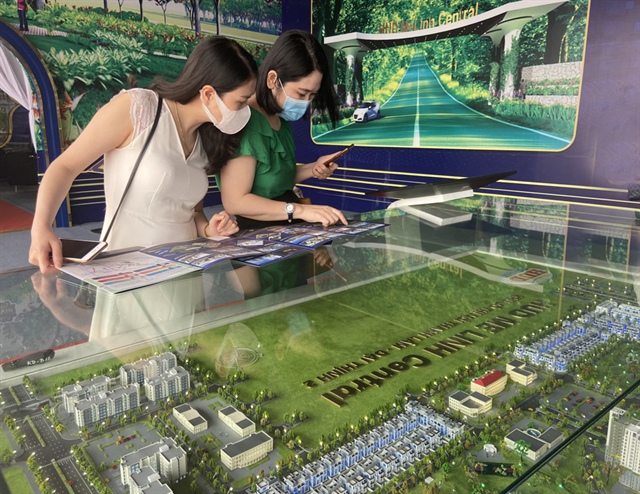|
Fundamentals of Hanoi real estate market remain solid
Foreign investors are actively exploring investment opportunities in the local real estate market, presenting chances for domestic firms if they can leverage this potential.
The real estate market in Vietnam, particularly in Hanoi, remains strong as the rapid and robust urbanization process has led to high demand for housing and real estate investment.

Buyers look at a real estate project in Me Linh District, Hanoi. Photo: Pham Hung/The Hanoi Times
|
"This indicates a favorable outlook for the real estate market as the demand for real estate continues to grow," said Nguyen The Diep, vice chairman of Hanoi Real Estate Club.
Assessing the Hanoi real estate market in the first half of 2023, Diep said the market is still in a sluggish state due to various factors such as credit tightening, challenges in issuing corporate bonds, and cautious customer sentiment following the ongoing revision of the Land Law in 2013.
"This has led to a cautious approach to buying and selling property," Diep said.
Meanwhile, a report by JLL Vietnam suggested that demand for properties with affordable prices remains stable. However, the supply of apartments in Hanoi in the first half of 2023 is limited, with most of the supply comprising high-end properties.
The market for villas and townhouses has been quiet as many investors hold onto their inventory. The number of new townhouse projects for sale has decreased significantly year-on-year. In the second quarter of 2023, only two projects with 54 apartments were launched for sale in the western area of Hanoi, compared to 60 in the previous quarter.
Do Thu Hang, Senior Director of Consulting and Research Department at Savills Hanoi, highlighted the efforts made by ministries, agencies and localities to address the challenges facing the real estate market.
Measures such as the Government's Resolution No. 33/NQ-CP, which aims to alleviate difficulties and obstacles in the property market, have created a more positive sentiment.
Recently, the Hanoi People's Committee has also taken steps to revoke the licenses of long-delayed projects, increasing market transparency and eliminating poor-quality projects, which has had a positive impact, Hang said.
"Overall, the Hanoi property market has experienced a quiet and challenging period in the first half of 2023, but the authorities' efforts and supportive policies are expected to improve market conditions and instill more confidence among investors and homebuyers," Hang suggested.
However, experts have expressed that the impact of supportive policies on the property market has been limited and overall progress has been slow. The market continues to face significant challenges, with companies struggling to access capital, numerous projects facing delays due to legal procedures, and a lack of progress in resolving these issues.
According to the Ministry of Construction, about 400 projects in Hanoi and Ho Chi Minh City are delayed or suspended due to legal procedures. Only five projects in Ho Chi Minh City have been resolved despite efforts.
Foreign investors to heat up market
To revitalize and stimulate the market, Hang of Savills Hanoi emphasizes the need for a comprehensive approach that includes legal policies and the improvement of laws related to land, housing and real estate business.
This includes facilitating additional new supply, providing clear market direction, and streamlining project review and approval processes.
"It is crucial to formulate policies on land prices, land use fees, and land rents that align with common interests and foster a stable and sustainable market. Flexible and reasonable credit policies should also be considered. In addition, the development of convenient transportation infrastructure is essential to enable easy mobility between areas and maximize housing demand," Hang said.
On the investor side, Hang noted that flexibility is needed in raising capital for project development beyond traditional bank financing.
This can include investment cooperation and attractive offerings such as competitive pricing and sales policies that take into account buyers' preferences.
Hang highlighted the positive outlook for attracting credit and capital from foreign real estate investment funds and companies in key areas, adding that these entities have a presence in Vietnam and are actively exploring investment opportunities, presenting opportunities for domestic real estate companies if they can tap into this potential.
Market research units forecast that the real estate market in Vietnam, including Hanoi, is unlikely to experience a supply boom in the last two quarters of 2023 due to economic pressures. However, the market is gradually adjusting to positive policy changes over time. The second half of 2023 is expected to be a period of recovery for the property market, with a slight upward trend. Housing demand will continue to focus on the affordable segment that meets practical needs.
Savills Hanoi believes the new supply remains limited due to delays in implementing solutions and policies. In terms of apartments, around 10 projects are expected to enter the market between now and the end of 2023.
In the long term, districts such as Nam Tu Liem, Hoang Mai, and Hoai Duc are expected to have the largest supply. For low-rise housing, large-scale domestic and foreign investors projects would be launched in Dong Anh and Dan Phuong districts within the next two years.
The supply of social housing is also expected to make a significant contribution. According to Savills Hanoi, the supply of social housing is equivalent to 59% of the supply of commercial housing in Hanoi over the next few years (approximately 95,200 units based on Savills' data). This increase in social housing supply aims to ease the pressure of the affordable housing shortage and help more people meet their home ownership needs.
Hanoi Times
|